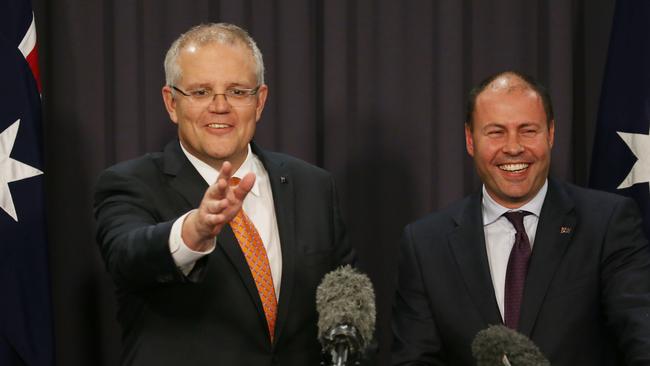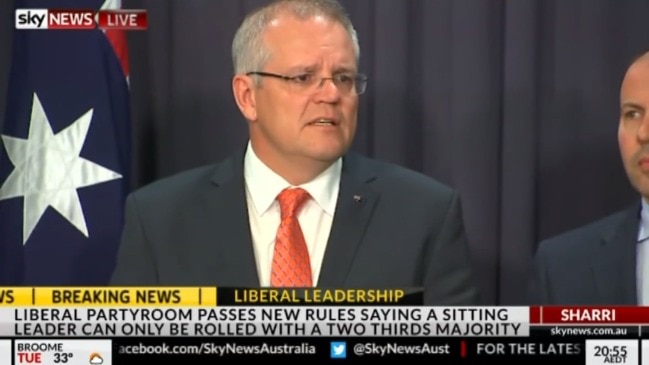Scott Morrison acts to lock in leadership with new rules
Scott Morrison asserts his authority over the Liberals by implementing sweeping changes to party rules preventing a repeat of the August spill.

Scott Morrison has moved to end the leadership crisis within the government by implementing sweeping changes to party rules aimed at preventing a sitting Liberal prime minister from being challenged.
The overhaul is a deliberate effort by Mr Morrison to assert his authority over the party, preserve his leadership from potential rivals including Julie Bishop, and assure voters the government can offer stability and continuity if re-elected next May.
The Prime Minister last night called an unscheduled partyroom meeting to discuss the shake-up after an extraordinary intervention by Malcolm Turnbull in the NSW preselection process aimed at denying Tony Abbott’s ally Craig Kelly another term in parliament.
After the meeting, Mr Morrison said the government had made a “historic decision” that he described as the biggest change to Liberal leadership rules since the party’s founding by Robert Menzies in 1944.
“We understand, our entire party, the frustration and the disappointment that Australians have felt when governments and prime ministers that they have elected under their authority, under their power, (have) been taken from them with the actions of politicians here in Canberra,” he said. “We understand that frustration. We understand that disappointment. We acknowledge it and we take responsibility for it … The Liberal Party … has made a decision and that decision is that an elected Liberal Party leader who goes to the election, wins that election and becomes prime minister — they will remain prime minister for that full parliamentary term”. The rule change was carried by a “consensus” decision of the Liberal partyroom, with Mr Morrison saying the government had returned power to voters.

Mr Morrison has come under attack from Bill Shorten to explain the decision to replace Mr Turnbull since the August 24 coup and US President Donald Trump also quizzed him about what happened to the former prime minister at the G20 meeting in Argentina last weekend.
The change to party rules will buttress Mr Morrison’s leadership and protect him from rivals until next year’s election, due to be held on May 11 or 18 following an April 2 budget. The rule change can only be overturned by a two-thirds vote of the partyroom. However, this rule would not apply in opposition.
Mr Morrison consulted with former Liberal prime ministers John Howard and Mr Abbott about the leadership reforms, but did not speak to his predecessor, Mr Turnbull. He also briefed Ms Bishop on the overhaul.
Senior government sources described the move as “highly defensive” and suggested Mr Morrison had also contemplated changes that would set a higher threshold for the removal of the leader in opposition.
Ms Bishop was at a function for outgoing UK high commissioner Menna Rawlings when last night’s meeting was called. She appeared unaware of the reason for the meeting and turned up more than half an hour late.
The change is similar to Kevin Rudd’s overhaul of Labor caucus rules introduced in 2013, also aimed at preventing the party from removing a first-time prime minister from office.
The Labor changes require a minimum of 60 per cent of caucus to agree to the removal of the leader while in opposition and 75 per cent of the caucus to agree to the removal of a prime minister while in government.
Mr Turnbull moved against Mr Abbott — also a first-term prime minister — in September 2015 and succeeded him as prime minister but lost 14 seats at the 2016 double-dissolution election.
He was replaced by Mr Morrison on August 24 after Mr Turnbull spilled the leadership to head-off a challenge from Home Affairs Minister Peter Dutton.
The move against Mr Turnbull was precipitated by the party’s poor showing in the Longman by-election in the battleground state of Queensland and amid concern over the government’s energy policy.
Mr Rudd last month urged the Liberal Party to adopt the self-described “Rudd rule” to prevent midnight leadership coups, declaring his reforms had “stabilised” Labor and provided Mr Shorten with an “extraordinary opportunity to focus on policy”.
Liberal National Party president Gary Spence, who agitated against Mr Turnbull in support of Peter Dutton, told The Australian the government’s prospects in Queensland under Mr Morrison were strong.
Mr Morrison last night said that for the new rule to be changed, “it would require a two-thirds majority of the parliamentary party” but noted that “such a majority is rarely if ever achieved”.
He framed the decision as an acknowledgment by the Liberal Party that its own conduct “needs to be changed”.
Treasurer Josh Frydenberg — Mr Morrison’s deputy — said instability inside the Liberal Party had diminished the parliament in the eyes of the public.





